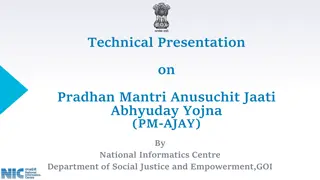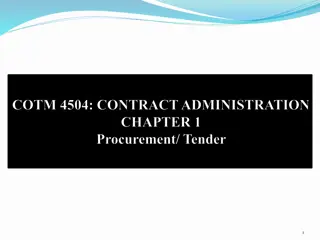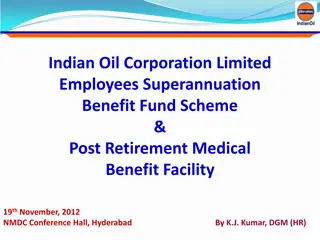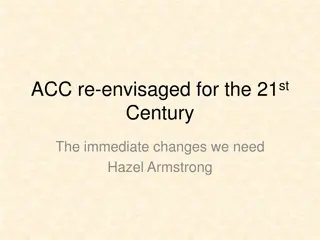
Understanding the Construction Industry Scheme EFJ Consulting
Understanding the Construction Industry Scheme EFJ Consulting.
Download Presentation

Please find below an Image/Link to download the presentation.
The content on the website is provided AS IS for your information and personal use only. It may not be sold, licensed, or shared on other websites without obtaining consent from the author. If you encounter any issues during the download, it is possible that the publisher has removed the file from their server.
You are allowed to download the files provided on this website for personal or commercial use, subject to the condition that they are used lawfully. All files are the property of their respective owners.
The content on the website is provided AS IS for your information and personal use only. It may not be sold, licensed, or shared on other websites without obtaining consent from the author.
E N D
Presentation Transcript
Understanding the Construction Industry Scheme: EFJ Consulting Every person should know something about the construction industry scheme within the UK since this forms an important part of the economy about employment opportunities as well as infrastructural development. The tax laws dominating the industry are not easy to deal with. One of the most important ones has been the Construction Industry Scheme, impacting both contractors and subcontractors in the construction industry. Specialized advice can be provided at EFJ Consulting on the requirements for CIS returns, bookkeeping and
VAT management. This article will therefore present a thorough coverage of what CIS is, how it works, and with our services, how a business could make its growth. What is the Construction Industry Scheme (CIS)? Overview of the CIS The Construction Industry Scheme, or CIS, for that matter, is a scheme of tax deduction introduced by HM Revenue and Customs (HMRC) to ensure that the subcontractors in the construction industry pay just the right amount of tax. CIS requires contractors to deduct some cash from payments made to subcontractors, and this cash is forwarded to HMRC. It has been designed as a tool for the prevention of tax avoidance from the construction industry and simplification of the taxing procedure. Who is affected by the CIS? The CIS affects various parties within the construction sector: Contractors: businesses or individuals that engage subcontractors for construction work. Subcontractors: individuals or businesses that provide construction services to contractors. Workers in the Construction Sector: All individuals working in construction must understand how the CIS affects their tax obligations. Key Objectives of the CIS 1.Tax Compliance: Ensuring that subcontractors pay the appropriate level of tax on their earnings.
2.Simplification of Tax Collection: Streamlining the tax collection process for HMRC by centralizing it within the CIS monthly returns in UK framework. 3.Encouraging Transparency: Promoting transparency within the construction industry by making tax obligations clear to all parties involved. Types of Registration There are two types of registration for subcontractors: 1.Gross Payment Status: This status allows subcontractors to receive their payments without any tax deductions. However, they must meet specific criteria, including being in business for at least some months and having a good compliance history. 2.Net Payment Status: This status requires contractors to deduct a percentage of tax from payments made to the subcontractor, which is then paid to HMRC. CIS Monthly Returns: A Detailed Breakdown Importance of CIS Monthly Returns CIS monthly returns in UK are essential for both contractors and HMRC. They ensure that the correct amount of tax is deducted and paid to the government. Proper submission helps maintain compliance and avoid penalties. Key Components of the Monthly Return 1.Contractor Information: Name, address, and registration number of the contractor.
2.Subcontractor Information: Name, address, and unique taxpayer reference (UTR) of each subcontractor. 3.Payments Made: Total payments made to each subcontractor during the month. 4.Deductions Taken: Amount of tax deducted from each subcontractor s payment. Submission Process The submission process for CIS monthly returns in UK includes: 1.Preparing the Return: Gather all necessary documentation and financial records. 2.Filing Online: Submit the return through the HMRC online portal. 3.Record Keeping: Maintain detailed records of all payments and deductions for at least three years, as HMRC may request these for audit purposes. Penalties for Non-Compliance Failure to submit CIS monthly returns on time can result in penalties, including fines and interest on unpaid taxes. Therefore, it s crucial for contractors to maintain compliance with HMRC requirements. Bookkeeping and VAT in the Construction Industry The Importance of Accurate Bookkeeping
Accurate bookkeeping is vital for any business, especially in the construction industry. It helps ensure compliance with tax regulations, provides a clear financial picture, and aids in strategic decision-making. Key Bookkeeping Practices 1.Maintain Detailed Records: Keep records of all income, expenses, invoices, and receipts. 2.Use Accounting Software: Implement accounting software to streamline bookkeeping processes and ensure accuracy. 3.Regular Reconciliation: Reconcile bank statements regularly to catch any discrepancies early. How EFJ Consulting Can Help Expert CIS Guidance EFJ Consulting, we specialize in providing comprehensive support for all aspects of the Construction Industry Scheme. Our expert team can assist you with: Registration: Helping contractors and subcontractors navigate the registration process with HMRC. Monthly Returns: Assisting with the preparation and submission of CIS monthly returns, ensuring compliance and accuracy. Tax Planning: Developing effective tax strategies to minimize liabilities under CIS and VAT. Bookkeeping Services
Our bookkeeping services are designed to help construction businesses maintain accurate financial records. We offer: Comprehensive Bookkeeping: Monthly or quarterly bookkeeping services to keep your financial records in order. Software Implementation: Assistance with selecting and implementing accounting software tailored to your business needs. Financial Reporting: Regular financial reports to provide insights into your business s performance and aid in decision-making. VAT Compliance Our VAT services ensure that your business meets all VAT obligations: VAT Registration: Assistance with the VAT registration process. VAT Returns: Preparation and submission of VAT returns to HMRC, ensuring compliance with all regulations. Advisory Services: Providing expert advice on VAT planning and compliance. Conclusion The Construction Industry Scheme is an integral part of the UK tax environment and, more particularly, of the construction industry. Here at EFJ Consulting, we know everything going on with CIS, month returns, bookkeeping, and VAT compliance. Our help is here to get you through the complex problems so that you can get back to what matters mostly running your business.
Do you require expert advice and consultation on your management of CIS obligations, bookkeeping, or your VAT compliance? Contact us today. Let EFJ Consulting be your trusted partner toward success and peace of mind with your finances in the construction industry.






















